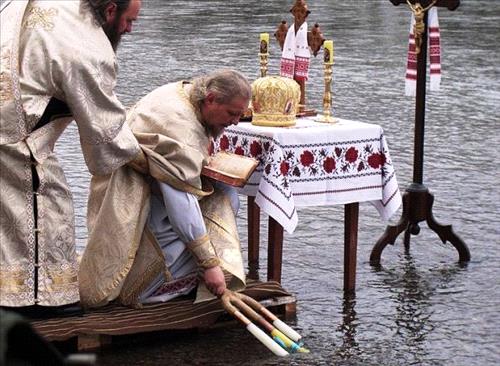Ammon News - The Economist - IT IS one of the most eye-catching and resonant moments in the calendar of the Christian east. On January 6th (or January 19th if you are observing the old calendar) the baptism of Jesus in the Jordan river is ritually commemorated when a priest or bishop casts a cross into the nearest available stretch of water. Hardy swimmers then plunge in to retrieve the precious object, and the one who grabs it first has the privilege of handing it back to the cleric who is master of ceremonies.
This is considered such a great honour that it is worth enduring a few moments of goose-pimples. In old-calendar countries like Russia (which is celebrating Christmas today), the January 19th proceedings can sometimes involve cutting a cross-shaped hole in thick ice, exposing a tiny patch of frigid water.
The atmosphere of the event varies a lot. In places where Christianity is the dominant religion, the ritual turns into a grandiose New Year's event at which politicians, mayors and police chiefs like to be photographed. A grainy piece of newsreel, taken in 1932, shows King Carol of Romania joining a throng of gorgeously robed prelates as they walked through the streets of Bucharest on their way to the ceremony. At this year's festivities in Greece, there was an edgy moment during the blessing of the petrol-stained harbour of Piraeus when same-sex couples staged a public kissing ceremony to protest over the ultra-conservative stance of the local bishop.
But an altogether different sort of edginess surrounds the ceremony in parts of the world where Christians are now a hard-pressed minority. At one location in Turkish-controlled northern Cyprus, where only a handful of Christians live, the ceremony was allowed this year for the first time in nearly 40 years. And in Istanbul, where Christians number a few thousand in a city of 15m, the annual plunge into the Bosphorus (for which there is no lack of takers) is a special moment for members of a local church which is tiny but historically important. This year Patriarch Bartholomew, the senior hierarch of the Orthodox world, left the job to a deputy because he had flu. But in years past he has conducted the water-blessing ceremony in some unlikely places, including the confluence of rivers that forms the Amazon, the melting coast of Greenland and the oily Gulf of Mexico. These rituals, he explained, were part of his campaign against water pollution and other environmental problems.
Yesterday there was another sort of ceremony in the place where, according to tradition, it all started. With many Jordanian and north European bigwigs in attendance, a Lutheran church was opened at the stretch of the Jordan river which has been regarded since early Christian times as the spot where Jesus plunged into the waters. Developing the Baptismal site as a pilgrimage destination has been an important project for the Jordanian royals; they have also encouraged the construction of Greek Orthodox, Russian Orthodox and Catholic churches in this quiet and beautiful location, where archaeological work has revealed structures that correspond exactly to the accounts of early Christian pilgrims. Bishop Munib Younan, a Palestinian Christian cleric who is also president of the Lutheran World Federation, said he was "swept by emotions" over the opening of a church with so many Biblical associations, involving Moses and Elijah as well as John the Baptist.
It is a paradox that some clerics, like Patriarch Bartholomew and Bishop Younan, can be simultaneously very powerful and very weak; while their local flock may be small and embattled, they hold positions of global importance. The "weakness" part does nothing to diminish their moral authority. Rather the opposite, in fact.
